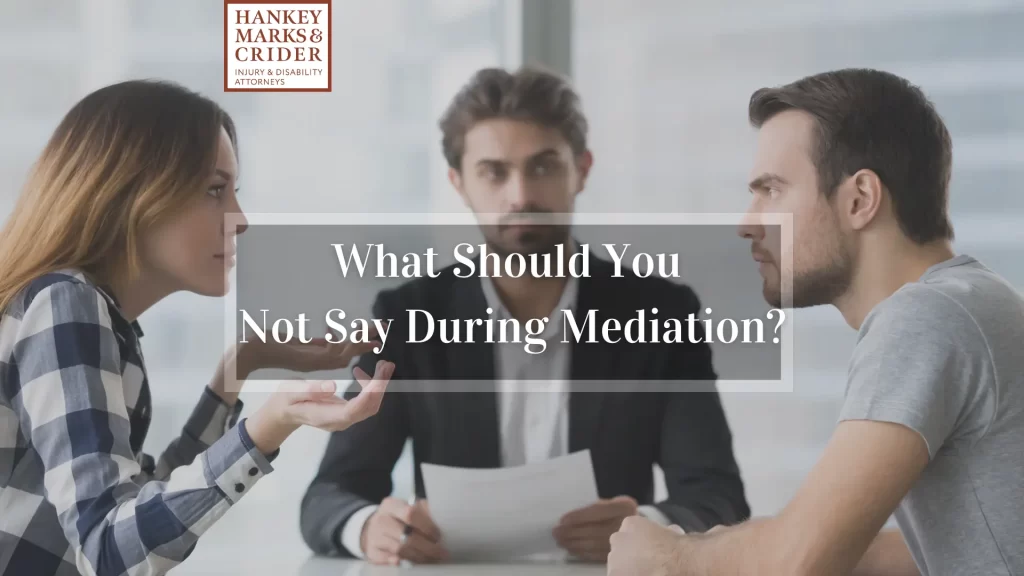 Mediation provides an informal setting to resolve legal disputes outside a traditional court of law. While the rules of evidence and discovery that generally apply to civil court litigation do not apply to mediation, any party to a mediation session must act respectfully. While evidence of conduct or statements made during mediation are not admissible in any later litigation, it is always wise to make only clear, compelling statements during mediation.
Mediation provides an informal setting to resolve legal disputes outside a traditional court of law. While the rules of evidence and discovery that generally apply to civil court litigation do not apply to mediation, any party to a mediation session must act respectfully. While evidence of conduct or statements made during mediation are not admissible in any later litigation, it is always wise to make only clear, compelling statements during mediation.
Always Speak with Controlled Emotions
Although mediation is a less formal, less contentious way of resolving a legal dispute, the parties are still likely to make it known when they disagree. When parties begin mediation, they often bring negative emotions such as anger and frustration.
Reaching an agreement and finding a solution requires patience, empathy, and understanding. Showing anger and other negative feelings indicates an unwillingness to compromise and will only stall or defeat any meaningful chance of negotiating a fair agreement.
Never raise your voice or use profanity. Expressing unhappiness over the situation is acceptable, but it is not a good idea to demonstrate your unhappiness using improper language and a loud, angry tone.
Do Not Insult or Attack the Opposing Party
When you demonstrate a willingness to compromise, you are showing respect to the other party. The failure to give the other party the expected amount of consideration and deference can make them unwilling to work with you. It may also make the mediator reluctant to work with you. Never say anything that gives the impression that you do not care about the opposing party’s position or interests in the lawsuit.
Do Not Assign Blame for the Lawsuit to the Opposing Party
Mediation starts with the parties making opening statements. A contentious opening statement sets the wrong tone for the remainder of the mediation. If your words make the opposing party angry or defensive, you can significantly reduce your chances of settling the case, wasting everyone’s time.
Parties to a mediation sometimes believe the opposing party needs to know the “truth.” This attitude might distance you from the other party. Never remark that a party needs to examine their behavior and learn the truth about their actions. It is not the purpose of mediation to allocate blame for allegedly wrongful conduct.
Do Not Introduce New Information or Evidence
Both parties should possess all the information necessary to evaluate the case when mediation begins. They should have obtained this information well before the scheduled date. Offering new information or evidence on the day of the mediation can substantially reduce your chances of settling the case through mediation.
Any new information or evidence will delay the mediation since the opposing party must review and analyze it before going forward. Unexpected or unanticipated revelations typically cause the opposing party to feel apprehensive, doubtful, and even deceived. A surprise will raise concerns about the possibilities of other withheld information relevant to the case.
Do Not Say Anything Indicating an Unwillingness to Participate in or Abide by a Settlement
When participating in mediation, you must show the other party you are open to compromise and willing to act amicably and cooperatively. You want the opposing party to believe that mediation will yield productive results. You should avoid offending the other party by making alienating comments or statements. If you must say something controversial, try to say it in the most constructive way possible.
When Can a Mediator Terminate Mediation?
 A mediator must terminate mediation whenever they believe continuing will harm or prejudice one or more parties. A mediator must also terminate mediation when either party shows an inability or unwillingness to participate meaningfully to the extent that it is unlikely that the parties will reach a fair agreement. Making unexpected, contentious statements in a hostile manner can demonstrate your inability or unwillingness to reach a reasonable settlement, causing the mediator to terminate the process. This can waste the time and money of everyone involved.
A mediator must terminate mediation whenever they believe continuing will harm or prejudice one or more parties. A mediator must also terminate mediation when either party shows an inability or unwillingness to participate meaningfully to the extent that it is unlikely that the parties will reach a fair agreement. Making unexpected, contentious statements in a hostile manner can demonstrate your inability or unwillingness to reach a reasonable settlement, causing the mediator to terminate the process. This can waste the time and money of everyone involved.
After the parties have completed at least two mediation sessions, either party may terminate the mediation. The mediator may not state the reason for termination except when the termination is due to bias or a conflict of interest by the mediator.
Contact an Experienced Mediation Attorney Today
The lawyers at Hankey Marks & Crider can help you find legal solutions and advocate for your mediation. Call (317) 634-8565 or use our online contact form to arrange a free consultation.
Related posts

